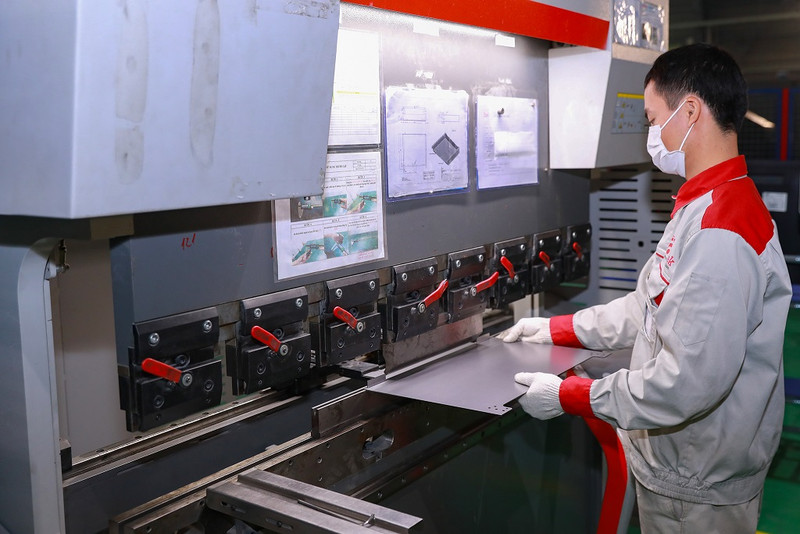As is usual in the early days of every year, the Vietnamese government has promulgated Resolution No.01/NQ-CP on the key tasks and solutions for the implementation of socioeconomic development plan and state budget estimates for the year, and Resolution No.02/NQ-CP on measures to improve the business climate and enhance the national competitiveness in 2023.
However, it has become a little bit different this year when on January 8, 2022, Prime Minister Pham Minh Chinh inked and promulgated only Resolution No.01/NQ-CP on all these tasks and measures, with a big order focussing on mobilising all resources to effectively carry out the country’s Programme on Socioeconomic Recovery and Development for 2022-2023 (PSRD).
“Drastic efforts must be made to accelerate the implementation of the PSRD,” the fresh resolution stressed.
“We must make our best determined efforts to implement the PSRD, and three national target programmes, and to boost disbursement of public investment capital. In addition, it is necessary to handle the shortcomings and weaknesses of the economy and remove growth bottlenecks and obstacles in mechanisms and policies,” stated PM Chinh.
He also stressed that authorised agencies and ministries have to focus on building infrastructure and urban development while speeding up the construction of a number of key, national, inter-regional and major urban infrastructure projects.
“We must also boost production and business, with greater support for enterprises. We have to promote the reorganisation and renovation of, and improve the efficiency of state-owned enterprises (SOEs) while fostering the development of the private economy,” PM Chinh noted. “We must have solutions to effectively mobilise resources of SOEs into such fields as energy, digital transformation infrastructure, green transformation, clean transformation, national important transport infrastructure, and supply of raw materials and important inputs for production.”
PSRD extension expected
In 2023, the government is set to continue extending the time of deployment of many kinds of taxes and fees, and to accelerate public investment under the PSRD.
The government has forecast that this year will see more challenges than favourable conditions. After some advantages in the latter half of 2022, this year will see an increase in complicatedness and risks due to global geographical tensions and uncertainties, while enterprises and people’s resilience has been running down.
According to calculations by the Ministry of Finance (MoF), under all fiscal policies of the PSRD on tax payment extension that was already fixed by the National Assembly (NA) are worth about 5.87 billion USD – and by November 2022, close to 4.6 billion USD had been carried out, accounting for 78.5%.
Meanwhile, policies on tax exemption and reduction under the PSRD were initially allowed by the legislature to be 2.78 billion USD – and at the end of last November, the realised sum sat at 2.07 billion USD or around 74.7%.
Thus, as much as two thirds of this fiscal initiative under the PSRD has been deployed, with only one third left for December (when the implemented figures have yet to be calculated and announced) and the entire 2023. Meanwhile, demands of businesses for more assistance from the policy is quite big.
“We want to get supported in terms of taxes and fees,” said Nguyen Van Manh, vice director of Hoang Mai Trading Ltd. in Hanoi – which is specialised in trading in farm produce. “Like many other companies, we are now burdened by a raft of different types of taxes such as corporate income tax, VAT, business-license tax, and personal income tax, as well as assorted fees such as commodity storage and transportation.”
According to the General Statistics Office (GSO), last year, the number of businesses with halted operations hit 73,800 - up 34.3% year on year. What is more, the number of those with halted operations and waiting for dissolution reached 50,800 – up 5.5%; while the number of those having completing dissolution procedures sat at 18,600 – up 11.2%. On average, each month witnessed as many as 11,900 enterprises withdrawing from the market.
Bright budget landscape
However, the MoF said that in spite of continued woes, the fiscal policy under the PSRD has been “actively employed in order to remove difficulties for businesses and create momentum for enterprises’ production and business activities, and therein generate revenue for the state budget.”
Under the MoF’s calculations, the implementation of exemption, reduction, and extension of taxes and fees within a limited period and the disbursement of a number of state budget expenditure sums within 2022 is estimated to be valued at more than 2% of GDP.
Last year, the total state budget recorded a surplus of 9.67 billion USD, which is a stark contrast to the figure of about 18.14-18.23 billion USD predicted just a few months ago.
In 2022, total budget expenditure is estimated to be over 67.93 billion USD– equivalent to 87.5% of the year’s estimates and up 8.1% year on year.
The budget spending has ensured demands for socioeconomic development, national defence and security, state management, payment of debts that are due, support for people hit by COVID-19, and restoration of production activities in areas affected by natural disasters and the pandemic.
Meanwhile, the state budget revenue is estimated to hit 77.6 billion USD, equal to 126.4% of the year’s estimates and up 13.8% year on year. All types of revenue have seen a year-on-year rise, mirroring recovery in almost all sectors of the economy.
MoF Minister Ho Duc Phoc said, “We have been implementing budget collection measures such as issuing e-invoices, building a cross-border e-portal. For example, in the first nine months of this year, we have collected 137.7 million USD from 37 international technology groups.”
He anticipated this year will “see more difficulties as prices of raw materials have increased strongly, with the price of imported materials rising 10.86% year on year so far this year, while the price of domestic materials has also followed suit, at 6%. Meanwhile, the price of petrol, oil, and gas has also stayed on a high level.”
According to the MoF, the credit room has been tightened and the capital market has also become increasingly difficult.
“The world’s inflation and global interest rates have soared, having negative impacts on our socioeconomic management in the coming year. While costs continue to rise, demand falls, making it difficult for production and business activities,” Minister Phoc said.
The NA in November 2022 ratified a resolution on the nation’s Plan on Socio-economic Development for 2023 – under which the GDP growth is set to be 6.5% – lower than the 8.02% economic growth rate for 2022, while per capita income will be 4,400 USD – higher than last year’s level of about 4,075 USD, and the ratio of manufacturing and processing in GDP will be 25.4 – 25.8%.
Boosting public investment
PM Chinh also underlined that under the PSRD in 2023, it is a must to accelerate public investment, which is considered a key pillar for economic growth.
Together with promptly completing investment procedures for public investment capital in the 2021-2025 period, ministries, sectors and localities must strengthen the monitoring of projects using the capital and closely controlling the implementation of the projects, he asked.
They have also been ordered to apply specific new measures to remove difficulties, especially in ground clearance, while fighting corruption during the process.
According to the Asian Development Bank, in addition to spurring on local consumption, the government must find all ways to accelerate public investment as one of the key pillars for economic growth this year and beyond.
At the end of last year, public investment disbursement was 18.9 billion USD, equivalent to 75.11% of the allocation plan, tantamount to the performance of the same period during 2016-2020 and lower than the same period 2021 (77.3%), according to the Ministry of Planning and Investment.
















